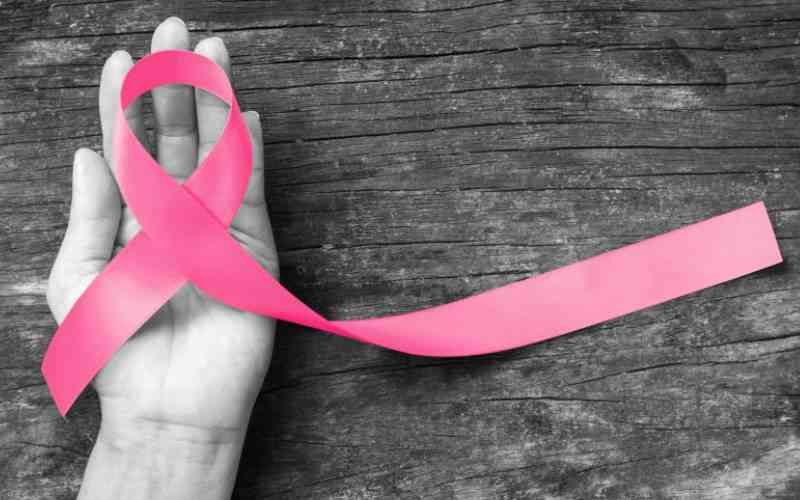
Elas Wanja suffered severe headache and fatigue. Painkillers did not help. She grew weaker and the headache was interfering with her house chores and farming activities.
The 58-year-old from Kiamwinja village in Embu County was later diagnosed with hypertension at Kairuri Hospital.
“I used to experience headache more often, which was on and off. But before being diagnosed, the pain was unbearable and I got weaker,” says Wanja.
She attributes her high blood pressure to unmanageable stress levels and anxiety she suffered after the death of her elder sister, who succumbed to effects of a blood clot in the brain five days after a successful surgery.
“The death of my sister took a toll on me. She was my best friend. As I mourned her, I developed headache that could not be subsidised with painkillers,” Wanja told Heath & Science at her home.
As per her medical record, she was diagnosed with stage three hypertension, and she was headed to severe hypertension, which is clustered as an emergency.
Medics placed her on a healthy diet and physical exercise besides advising that she adheres to daily medication.
“I have reduced uptake of sugar and salt, and exercise more often, spending the better part my day in dairy and coffee farming to manage the hypertension,” she said.
Wanja is among hundreds of thousands of Kenyans nursing hypertension.
Health & Science found Daniel Nyanga in the neighbouring Gatiriri village busy tending to his vegetable and fruit garden.
This is the daily routine of the 55-year-old to keep stress at bay. Stress triggered his hypertension, and now he manages the condition with drugs and diet full of vegetables. He avoids foods high in calories, sugar and salt.
General body weakness and fatigue
“I wake up every morning with drugs in hand like food, and if I fail, I experience headache, fatigue and blurred vision, “says Nyaga. “It is unfortunate that I will take these drugs until death.”
Before being diagnosed with hypertension in 2018, he often experienced general body weakness and fatigue.
Though he receives free medicine supplies from Médecins Sans Frontières (MSF), a health NGO educating locals on Non-Communicable Diseases, Nyaga laments the high financial burden of managing hypertension.
He spends about Sh2,000 on drugs monthly whenever there is no supply.
Surveys done by a team of Kenyan scientists at primary health levels show that patients spend between Sh8,000 and Sh10,000 on transport, consultation and hypertension drugs in public hospitals, which range from health centres to Level Four hospitals.
Patients with hypertension and other conditions spend even more money.
“Just like HIV and TB drugs, why can’t the government supply us with hypertension drugs? This disease is silently killing people,” said Nyaga.
The struggle that Wanja and Nyaga go through in delay to access healthcare and medication mirrors the challenges facing thousands of Kenyans battling hypertension, a silent killer disease.
Jemimah Kamano, an endocrinologist (hormone specialist) and disease researcher, said hypertension was consistent with raised blood pressures, with majority of patients diagnosed at 30 years and above due to lifestyle, while in children, it is triggered by underlying diseases like kidney or hormonal related issues.
Lifestyle is commonly related to having increased weight, eating unhealthy diet, taking a lot of salt in food and lack of exercise.
Other triggers include smoking cigarettes, excessive alcohol intake and high stress levels.
Abnormal cholesterol
Some drugs like steroid and oral family planning also predispose individuals to hypertension.
Dr Kamano, also a lecturer at Moi University School of Medicine, said other health conditions like diabetes, anxiety disorders, depression and abnormal cholesterol also trigger hypertension.
She said hypertension was a silent disease, usually discovered at adverse stage, as majority of patients do not undertake screening, a simple, painless and non-invasive procedure.
“A patient will wait for signs and symptoms of hypertension. They will occur, yes, but they will be signs and symptoms of a stroke coming, or having a heart attack or heart failure. The signs and symptoms come too late,” explained the expert, adding that there is need for annual medical check-up.
In younger adults, symptoms include ringing of ears, unexplained headache, abnormal sensation of the skin, fatigue and a racing heart.
Stages of hypertension are Pre-hypertension, stage one, stage two, and systolic, which is commonly referred to as severe hypertension, and causes organ failure (emergency hypertension).
According to a survey done in 2017, at least 25 per cent of Kenyans have hypertension.
“In Western Kenya, about 36 per cent of the population have hypertension, 30 per cent are healthy, with 70 per cent likely to get hypertension,” said Kamano.
Treatment of hypertension is based on the cause of hypertension. For example, if caused by smoking, then the first thing is to stop smoking, and if it is secondary, treating the disease would cure the hypertension.
However, Kamano says majority of Kenyans have essential hypertension, where blood vessels become stiff over time because of wrong lifestyle choices.
Though there are different classifications in treating hypertension, patients are advised to adhere to a healthy lifestyle since most will be on drugs for the rest of their lives. Some patients have been found to stop taking drugs after learning hypertension cannot be cured.
Break banks of the blood vessels
Hypertension drugs reduce blood pressure by slowing the pace at which the heart beats, and the force it uses to pump out blood.
Some drugs reduce stiffness of blood vessels, while others reduce salt circulation. “Patients are encouraged to eat less starch foods, take a lot of vegetables, reduce salt, avoid adding salt on the plate and find better mechanism of coping with stress,” she advised.
“Complications of hypertension are dire. Like a river that has a lot of water, the main risk is bursting its banks. It is the same with hypertension that will break banks of the blood vessels and cause injuries, flowing very fast. This causes death,” said Dr Kamano.
“Injuries allow cholesterol to get into the wall and form plagues or swelling, narrowing blood vessels significantly and as a result, making one prone to heart attack, stroke and complications in the lower legs that do not have blood circulating. This may call for amputation, at worst, “she said.
The pressures can also cause havoc in the kidneys and eyes.
Dr Kamano called for training of community health volunteers to dispense the hypertension drugs.
Anne Njagi, an MSF volunteer in Embu, said: “We have clustered patients in groups where we train them on adherence to drugs, type of diet they should consume, and why hospital visits are important.”
Before the training, majority of patients would default on medication, resulting in adverse effects like kidney complications, stroke and death.
“Patients used to drop drugs because they did not know hypertension is a chronic disease managed for an entire life. But we are happy that with regular engagement, we do not have defaulters,” added Njagi.
Dr Kamano warns that hypertension will in due course get very serious, as “we might have dialysis equipment at every corner on the streets of the country”, but regular checkups can help, and people “should walk to any facility, including chemists, to have their sugar levels checked. It is also important to exercise more, and reduce excessive consumption of alcohol.”
 The Standard Group Plc is a multi-media organization with investments in media platforms spanning newspaper print
operations, television, radio broadcasting, digital and online services. The Standard Group is recognized as a
leading multi-media house in Kenya with a key influence in matters of national and international interest.
The Standard Group Plc is a multi-media organization with investments in media platforms spanning newspaper print
operations, television, radio broadcasting, digital and online services. The Standard Group is recognized as a
leading multi-media house in Kenya with a key influence in matters of national and international interest.










